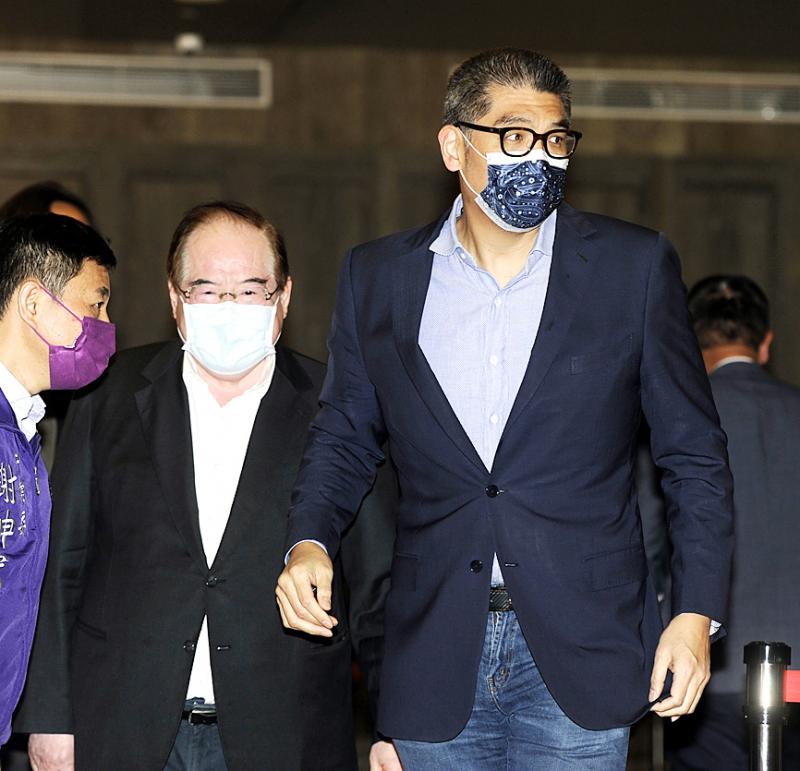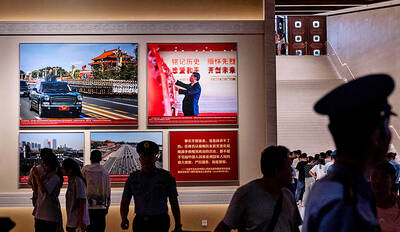Sean Lien (連勝文), vice chairman of the National Policy Foundation, which is affiliated with the Chinese Nationalist Party (KMT), yesterday said that he would “seriously consider” running for KMT chairman in an election that is expected to take place in July.
Lien, the son of former vice president and former KMT chairman Lien Chan (連戰), was the KMT’s Taipei mayoral candidate in 2014. He lost to Taipei Mayor Ko Wen-je (柯文哲), who ran as an independent and was backed by the Democratic Progressive Party.
Asked in a radio interview yesterday whether he would run for KMT chairman, Lien said that before this week he had not made any plans to do so.

Photo: Lin Cheng-kung, Taipei Times
However, he said that many people had encouraged him to run.
Starting yesterday, he would “seriously consider” a campaign for KMT chairman, he said, adding that he would also begin to consult community leaders on public issues.
Asked what would be the key to him deciding whether or not to run, Lien said it would depend on whether he believes he would be able to help the KMT accomplish the goals he envisions.
If he would not be able to push his vision for the party, he would not “waste time,” Lien said.
For example, if KMT members insisted that the party needed a savior-type figure, “then never mind,” he said.
Lien wrote on Facebook on Tuesday that future KMT chairpersons should not seek nomination for public office, especially the presidency.
The chairperson should be focused entirely on party affairs, he wrote.
Asked after yesterday’s radio interview when he would announce his decision, Lien said that he would first consult with his friends in the KMT.
He told reporters that his Facebook comments were an expression of his personal views, and were not aimed at any specific individual.
KMT Chairman Johnny Chiang (江啟臣), who is a legislator, on Feb. 20 announced that he would seek re-election as party chairman, and said he hoped to be a “kingmaker” who would find the strongest candidates to represent the party in the elections next year and in 2024.
Additional reporting by Sherry Hsiao

Three batches of banana sauce imported from the Philippines were intercepted at the border after they were found to contain the banned industrial dye Orange G, the Food and Drug Administration (FDA) said yesterday. From today through Sept. 2 next year, all seasoning sauces from the Philippines are to be subject to the FDA’s strictest border inspection, meaning 100 percent testing for illegal dyes before entry is allowed, it said in a statement. Orange G is an industrial coloring agent that is not permitted for food use in Taiwan or internationally, said Cheng Wei-chih (鄭維智), head of the FDA’s Northern Center for

The Chinese military has built landing bridge ships designed to expand its amphibious options for a potential assault on Taiwan, but their combat effectiveness is limited due to their high vulnerability, a defense expert said in an analysis published on Monday. Shen Ming-shih (沈明室), a research fellow at the Institute for National Defense and Security Research, said that the deployment of such vessels as part of the Chinese People’s Liberation Army (PLA) Navy’s East Sea Fleet signals a strong focus on Taiwan. However, the ships are highly vulnerable to precision strikes, which means they could be destroyed before they achieve their intended

About 4.2 million tourist arrivals were recorded in the first half of this year, a 10 percent increase from the same period last year, the Tourism Administration said yesterday. The growth continues to be consistent, with the fourth quarter of this year expected to be the peak in Taiwan, the agency said, adding that it plans to promote Taiwan overseas via partnerships and major events. From January to June, 9.14 million international departures were recorded from Taiwan, an 11 percent increase from the same period last year, with 3.3 million headed for Japan, 1.52 million for China and 832,962 to South Korea,

REWRITING HISTORY: China has been advocating a ‘correct’ interpretation of the victory over Japan that brings the CCP’s contributions to the forefront, an expert said An elderly Chinese war veteran’s shin still bears the mark of a bullet wound he sustained when fighting the Japanese as a teenager, a year before the end of World War II. Eighty years on, Li Jinshui’s scar remains as testimony to the bravery of Chinese troops in a conflict that killed millions of their people. However, the story behind China’s overthrow of the brutal Japanese occupation is deeply contested. Historians broadly agree that credit for victory lies primarily with the Chinese Nationalist Party (KMT)-led Republic of China (ROC) Army. Its leader, Chiang Kai-shek (蔣介石), fled to Taiwan in 1949 after losing a